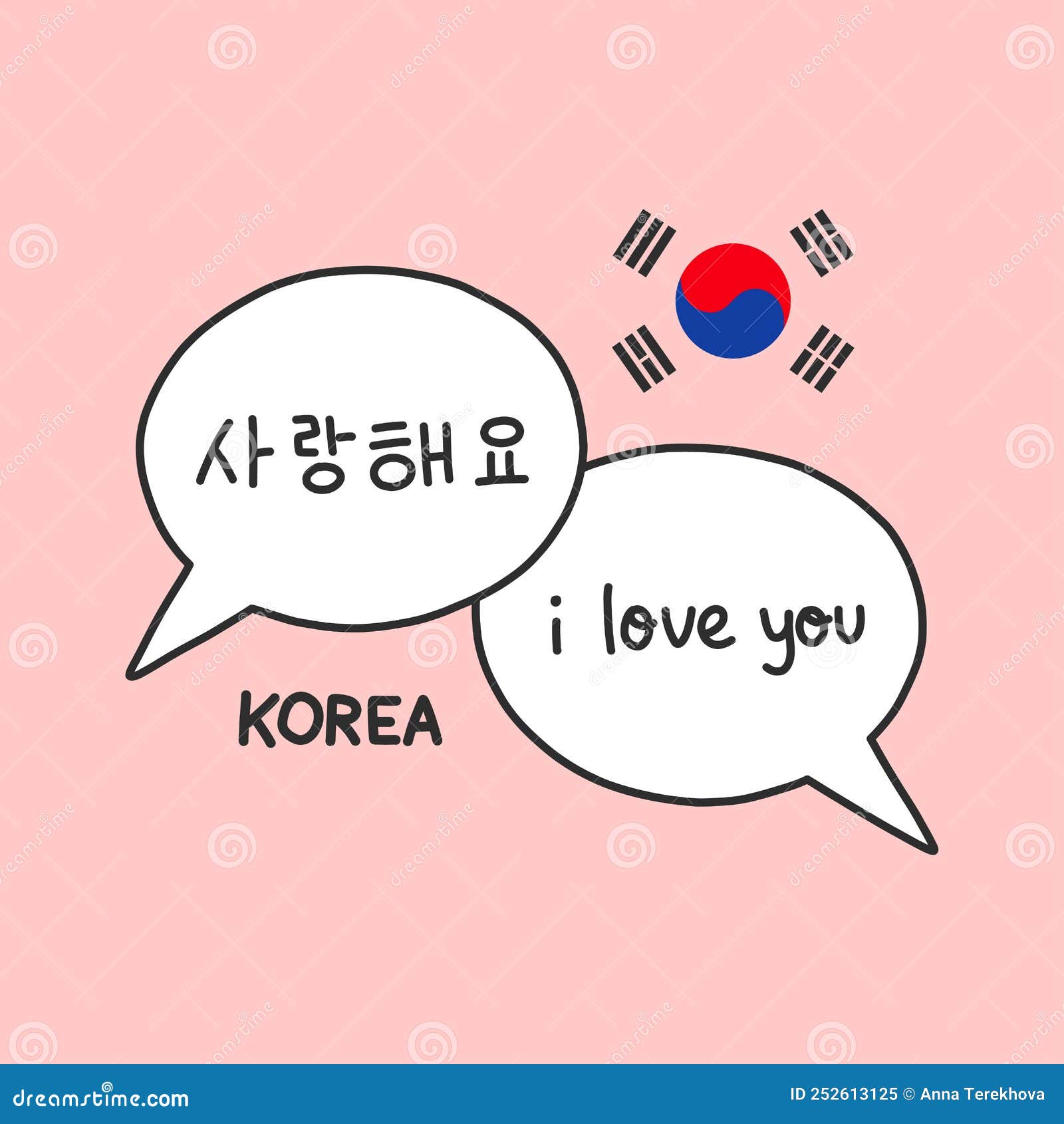Let's talk about love, Korean-style. If you're here, chances are you've got a special someone on your mind and you're ready to spice things up with some romantic Korean phrases. Saying "I love you" in Korean is more than just words—it's an expression of emotion that carries centuries of cultural significance. Whether you're diving into Korean dramas or planning to impress a loved one, this guide will take you through everything you need to know about expressing love in Korean.
Now, before we dive into the juicy details, let's set the scene. Korean culture is rich, vibrant, and filled with traditions that make expressing love a little more meaningful than just throwing out three little words. In this article, we'll explore the nuances of saying "I love you" in Korean, the cultural context, and how to make sure you're doing it right. So, buckle up, because we're about to embark on a love-filled journey!
By the end of this guide, you'll not only know how to say "I love you" in Korean but also understand the depth and beauty behind the language. Let's get started, shall we? And remember, love knows no boundaries—especially when you're armed with the right words!
Read also:Ben Affleck Smoking The Truth Behind The Headlines
Here's the table of contents to help you navigate through this love-filled guide:
- The History of Korean Love Language
- Basic Phrases: How to Say "I Love You" in Korean
- Understanding the Cultural Context
- Different Variations of "I Love You" in Korean
- Romantic Expressions Beyond "I Love You"
- Common Mistakes to Avoid
- Tips for Learning Korean Love Phrases
- Practical Usage in Real-Life Scenarios
- Further Resources for Language Enthusiasts
- Conclusion: Spread the Love
The History of Korean Love Language
Let's rewind for a moment and take a peek into the history of Korean love language. Korean culture has always placed a strong emphasis on relationships and emotions, but expressing love hasn't always been as straightforward as it is today. In ancient Korea, love was often expressed through poetry, music, and art rather than direct words. It was a time when subtlety and nuance reigned supreme.
Fast forward to modern times, and Korean society has embraced more open expressions of love, especially with the influence of K-pop, K-dramas, and global cultural exchange. Today, saying "I love you" in Korean is both a declaration of affection and a way to connect with someone on a deeper level.
Here's a quick timeline to give you a better understanding:
- Pre-Modern Era: Love was expressed through traditional art forms like poetry and calligraphy.
- 20th Century: The Korean language began to evolve, and direct expressions of love became more common.
- 21st Century: With the rise of K-pop and global influence, saying "I love you" in Korean has become a universal expression of affection.
Basic Phrases: How to Say "I Love You" in Korean
Alright, let's cut to the chase. How do you actually say "I love you" in Korean? The most common phrase is "Saranghae," which translates to "I love you." But hold your horses—there's more to it than just the words themselves. Pronunciation, tone, and context all play a role in making your declaration of love sound heartfelt and authentic.
Here's a breakdown of the phrase:
Read also:The Rug Mine Your Ultimate Destination For Highquality Rugs
- Sarang: Love
- Hae: A verb meaning "do" or "have" in this context
Putting it all together, "Saranghae" literally means "I have love for you." Simple, right? But don't forget to practice your pronunciation. Korean pronunciation can be tricky for beginners, so take your time to get it right.
Formal vs Informal Versions
Now, here's where things get interesting. Korean is a language that values politeness and respect, so there are different ways to say "I love you" depending on the relationship between the speakers.
- Informal: "Saranghae" is used among close friends, couples, or people of the same age group.
- Formal: "Saranghaeyo" is the polite version, used when speaking to someone older or in a formal setting.
Choosing the right version is crucial to avoid awkward moments, so make sure you know your audience before declaring your love!
Understanding the Cultural Context
Culture plays a massive role in how love is expressed in Korea. While Western cultures might emphasize grand gestures and public displays of affection, Korean culture often leans toward subtlety and respect. Saying "I love you" in Korean isn't just about the words—it's about the context in which they're said.
Here are a few cultural nuances to keep in mind:
- Respect: Koreans value respect in relationships, so using the right level of politeness is essential.
- Non-Verbal Cues: Actions often speak louder than words in Korean culture. Small gestures like holding hands or sharing food can be just as meaningful as saying "I love you."
- Timing: In Korea, timing is everything. Declaring your love too early or in the wrong setting can come off as impulsive or inappropriate.
Understanding these cultural nuances will help you navigate the world of Korean love language with confidence and sensitivity.
Different Variations of "I Love You" in Korean
Now that you know the basics, let's explore some variations of "I love you" in Korean. Just like in English, where you might say "I adore you" or "You mean the world to me," Korean has its own set of romantic phrases to express different shades of love.
Common Variations
Here are a few popular variations:
- Saranghae: The standard "I love you."
- Nae sarang: "My love" or "Beloved."
- Saranghae neomu: "I love you very much."
- Nae geot saranghae: "I only love you."
Each variation carries its own weight and meaning, so choose wisely depending on the depth of your feelings and the context of your relationship.
Romantic Expressions Beyond "I Love You"
While "I love you" is a powerful phrase, Korean offers a wealth of romantic expressions that can add depth and variety to your declarations of love. These phrases can help you express your feelings in more nuanced ways, making your conversations with your loved one even more meaningful.
Some Romantic Phrases
Here are a few romantic expressions to spice up your love life:
- Nae chingu: "My friend" (a term of endearment for close friends or lovers).
- Nae saranghae neomu saranghae: "I love you so much, I love you."
- Nae geot jom saranghae: "I only kind of love you" (a playful way to express affection).
These phrases can be used in various contexts, from casual conversations to heartfelt declarations, depending on your relationship dynamic.
Common Mistakes to Avoid
Learning a new language, especially one as nuanced as Korean, can be tricky. Here are a few common mistakes to watch out for when saying "I love you" in Korean:
- Pronunciation Errors: Korean pronunciation can be challenging, so make sure to practice until you sound natural.
- Wrong Politeness Levels: Using the informal version in a formal setting or vice versa can lead to awkward moments.
- Overusing Romantic Phrases: While it's great to express your feelings, overusing romantic phrases can come off as insincere or overly dramatic.
Avoiding these mistakes will help you communicate your love more effectively and avoid any potential misunderstandings.
Tips for Learning Korean Love Phrases
Ready to take your Korean love language skills to the next level? Here are a few tips to help you learn and master these phrases:
- Practice Regularly: Consistent practice is key to improving your pronunciation and understanding of Korean phrases.
- Watch Korean Dramas: K-dramas are a great way to see how love phrases are used in real-life scenarios.
- Use Language Apps: Apps like Duolingo or Memrise can help you learn Korean phrases at your own pace.
By incorporating these tips into your learning routine, you'll be well on your way to becoming a Korean love language expert!
Practical Usage in Real-Life Scenarios
Now that you know the phrases and the cultural context, it's time to put your knowledge into practice. Here are a few real-life scenarios where you can use your newfound Korean love language skills:
- On a Date: Surprise your partner by saying "Saranghae" during a romantic dinner.
- Over Text: Send a sweet message like "Nae saranghae neomu" to brighten their day.
- In Conversation: Use phrases like "Nae chingu" to show your affection during casual conversations.
Practical usage is all about timing and sincerity, so make sure your words come from the heart!
Further Resources for Language Enthusiasts
If you're eager to dive deeper into the world of Korean language and culture, here are a few resources to explore:
- Books: "Korean Made Simple" by Billy Go is a great starting point for beginners.
- Websites: Sites like Talk To Me In Korean offer free lessons and resources for language learners.
- YouTube Channels: Channels like Korean Unnie and Learn Korean with Go Billy Kim provide engaging content for learners of all levels.
These resources will help you expand your knowledge and continue your journey in mastering Korean love language.
Conclusion: Spread the Love
And there you have it—a comprehensive guide to saying "I love you" in Korean. From the history and cultural context to practical usage and further resources, we've covered everything you need to know to express your love in Korean with confidence and authenticity.
Remember, love is universal, but expressing it in another language adds a special layer of meaning and connection. So, whether you're planning a romantic surprise or just want to impress your loved one, don't be afraid to use your newfound Korean skills.
Now, it's your turn to take action. Leave a comment below and let me know how you plan to use these Korean love phrases. Share this article with your friends and spread the love! And if you're hungry for more, check out our other articles on language and culture. Happy loving, everyone! 😊


